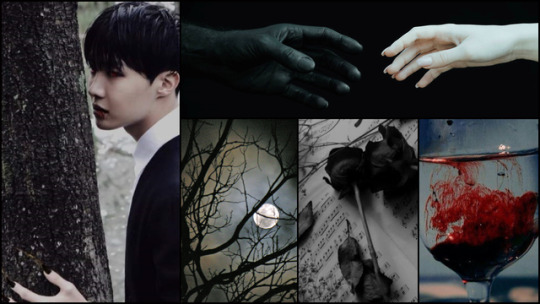#as i lay dying
Vermillion - Studio Diary
Band: As I Lay Dying
Song: The Blinding Of False Light
Album: The Powerless Rise (2010)
Country: USA
Genre: Metalcore
As I lay dying ~ Part two

Pairing ~ Jung Hoseok X Reader
Theme ~ Vampire AU
A/N ~ Ok, so I know I said I wasn’t sure if I would continue this but apparently my brain wanted to, all though I’m unsure how many parts there will be.
This one is from the readers POV and the confusion around when she first wakes up from part one, enjoy.
How long had it been since I woke up? How long was it since I first felt the cold that now permanently ran through my body? And how long since the sickening sweet scent of blood forced its way unto me?
The memory was still vivid but the days or weeks since had been a mere blur, merging together as I replayed those first moments over and over again.
My skin was so cold that the flesh seemed to be burning, the light of the room, dangling above my head like a pendulum, making it hard to open my eyes above anything but a flicker.
My fingertips slid with slight resistance across an ice cold yet smooth surface, a high pitched squeak piercing my eardrums every time my fingers skidded.
Panic flushed through my body as I tried to remember where I was. My toes twitched once I recalled. This, was not my bed.
I blinked wildly as I attempted to see my surroundings but the attempt was futile, the light blurred my vision, rendering my eyes useless.
Spasms like ripples ran through my body, my limbs uncooperative, resisting my command to a fluid movement and instead, knocked everything over as my body awkwardly rolled off whatever I had been laying on.
I fell to the floor, landing on my side, my body twisted in itself. The impact forcing shockwaves through my body but I could feel no pain. Why wasn’t there any pain?
Pushing myself up, I blocked out the obtrusively bright light with my arm. With squinted eyes, my blurry vision made out a silver table sat before me. Had that been what I was laying on?
My eyes dropped to the floor in confusion, the sight of my completely bare skin caught my eye. What was going on?
The last thing I could remember was that man sitting beside me, a feeling of peace as I drifted away, confusion setting in with his words.
“Don’t thank me yet, not until you wake up”
What had he done to me? He was supposed to help me die quickly in peace rather than slowly rot away in pain like I had been for years.
But here I was, cold, alone and confused.
The emotions swirling inside me were cut away suddenly, replaced by a primal darkness as my nose twitched, sniffing the air. A sweet copper scent filled it, I could feel my pupils dilate and my stomach growl. I’d never been so hungry in my life.
My body moved on it’s own, lifting me off the ground to crawl on the floor, following the scent to its source.
The blur that had once hindered my sight now lifted, I could make out the room, almost everything was made of metal, scrubbed to the point that it burnt my eyes when the light reflected from it.
I was getting close, I could feel my hairs standing on end, like my body was preparing for it.
Another table, just like the one I had just come from. Using the legs, I pulled myself up. Licking my lips, I braced myself on the counter to support my body that felt like dead weight. My once sturdy arms now trembled and my eyes widened in horror with what I saw.
It was a man, completely naked, his skin more pale than anybody’s I’d seen before, his lips cracked and deep blue, his chest cut open, exposing his organs stained bright red. My nose twitched, catching that scent again. It had been him, that smell that took over my senses had come from that hole that laid in his open chest.
“No…” I called meekly, my body shook with fear as I backed away from him, stumbling and falling once I had no support to lean on. I could feel my hunger grow the further I got from his lifeless body but I had to get away, I flailed on the floor, my arms and legs kicking at it as I tried to push away, tears streaming down my face at the fact that I had hungered for another human.
I caught sight of something moving in my peripheral vision but my body refused to act in time to do anything let alone get away.
A black mass was thrown over my body, someone worked quick to wrap it around me as a raspy voice spoke in a soft tone as if they were speaking to a frightened child. “It’s ok”
My eyes shot over at the familiar voice, the man I’d called to help end my suffering was crouched beside me, his eyes moist, twinkling with a sadness as he looked back at me.
“What…. Happened to me?” I asked, voice wavering as I fought with the tears that refused to back down.
“I’ll explain later” he replied softly, his gaze shifted away from me as he scooped me up and held me to his chest. “For now, we need to get you out of here”
I closed my eyes, my head nuzzled into the crook of his neck, my hand grasped at the fabric of his jacket as an odd peaceful sensation ran through me from his touch. It was almost as if we were bound to one another by some unseen force, like somehow we were connected.
Faulkner and Wittgenstein on the privacy of experience
(Pictured: Addie Bundren [Beth Grant] in James Franco’s 2013 adaptionofAs I Lay Dying. [Millennium Films])
William Faulkner (1897–1962) was a Nobel laureate who authored classic novels The Sound and the Fury(1929) and As I Lay Dying (1930) as well as many more. Here we explain how his characters in As I Lay Dying broach the struggle of expressing private experience, a struggle also described in the works of philosopher Ludwig Wittgenstein.
A poor and rural family slowly traverse the Mississippi countryside to bury their deceased wife and mother, Addie Bundren, miles away in town, meeting tribulations along the way.
In one chapter—from beyond the grave or in a flashback—Addie narrates her inability to express her private experiences of being a teacher, a wife, and a mother (ironically, using language). Whereas in action she is able to feel her own presence—for example, by physically punishing her students—she believes words to be like ‘spiders dangling by their mouths from a beam, swinging and twisting and never touching’.
‘That was when I learned that words are no good; that words don’t ever fit even what they are trying to say at. When [my son] was born I knew that motherhood was invented by someone who had to have a word for it because the ones that had the children didn’t care whether there was a word for it or not. I knew that fear was invented by someone that had never had the fear; pride, who never had the pride.’
Words, she expands, are ‘just a shape to fill a lack; that when the right time came, you wouldn’t need a word for that any more than for pride or fear’ or love.
This all should immediately remind us of the views of Wittgenstein, who argued that inner mental states cannot be known; that wouldn’t make sense, for they are incommunicable. There is a divide between mind and world, which is what Addie alludes to.
Nonetheless, in Philosophical Investigations (published posthumously in 1953) Wittgenstein writes that meaning can be conveyed, practically, if the rules of a public language game are followed, for language is a social practice.
Does this mean we shouldn’t try to bridge said gap? Here we can draw on Stanley Cavell’s distinction between (1) knowledge and (2) acknowledgement: (1) there is a limited capacity of language to capture truths about the world and others’ experiences; (2) however, through sympathy we can acknowledge in others what we cannot experience ourselves. Too stark a divide unduly abolishes our obligations to the world and that which we value.
Indeed, Addie is able to gain acknowledgement by forcing pain in others—her husband; her students—not by using words but by exacting revenge and violence. Of the students, she says:
‘I would look forward to the times when they faulted, so I could whip them. When the switch fell I could feel it upon my flesh […] and I would think with each blow of the switch: Now you are aware of me! Now I am something in your secret and selfish life.’
Addie is sceptical of language’s faithfulness to worlds privately and uniquely inhabited. But she seeks acknowledgement. Her daughter, Dewey Dell, unlike her mother, fears even acknowledgement: the obtaining of worldly connections is a violation of her aloneness. Of the recognisable changes to her body during an unwanted pregnancy, she says: ‘The process of coming unalone is terrible’.
The Bundrens are isolated farmers who live in simple fashion. Their thoughts are incoherent and stream-like. Faulkner and Wittgenstein both show that the private worlds from which we feel and sense are inaccessible to language. This limit is felt particularly strongly by the Bundrens, alienated countryfolk whose linguistic capacities and abilities to follow language games are already impoverished.
⁂
Words are signifiers. Your name, for example, signifies you, the signified. But perhaps saying is a cheap substitute for doing. Addie Bundren thought so.
‘Sometimes I would lie by him [my husband, Anse] in the dark, hearing the land that was now of my blood and flesh, and I would think: Anse. Why Anse? Why are you Anse. I would think about his name until after a while I could see the word as a shape, a vessel, and I would watch him liquefy and flow into it like cold molasses flowing out of the darkness into the vessel, until the jar stood full and motionless: a significant shape profoundly without life like an empty door frame; and then I would find that I had forgotten the name of the jar […]
‘I would think how words go straight up in a thin line, quick and harmless, and how terrible doing goes along the earth, clinging to it.’
Post link






![Faulkner and Wittgenstein on the privacy of experience(Pictured: Addie Bundren [Beth Grant] in James Faulkner and Wittgenstein on the privacy of experience(Pictured: Addie Bundren [Beth Grant] in James](https://64.media.tumblr.com/a3e77e51df6a393b3d6f1dfcef07faae/e6d137e19008395e-56/s500x750/c0371d7d5d4345963ffbdc5b607e7e7dfced4659.jpg)